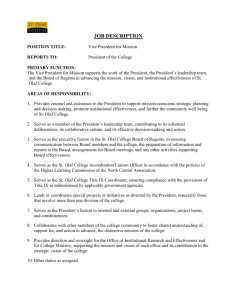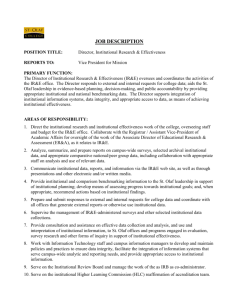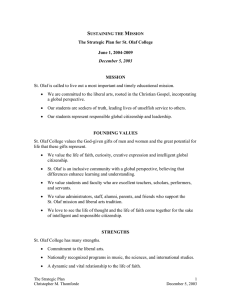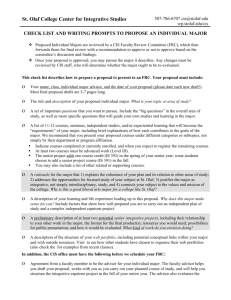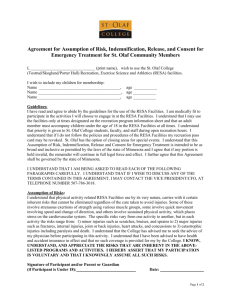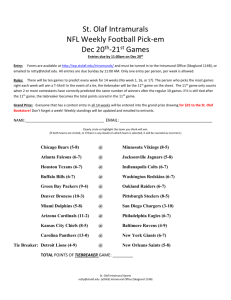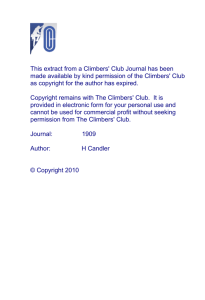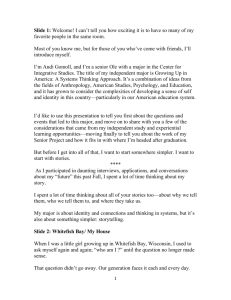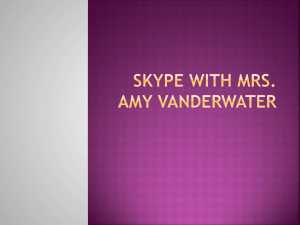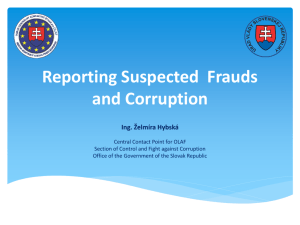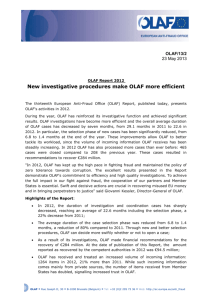Campus Ecology Journal Prompts: Sustainability & Reflection
advertisement
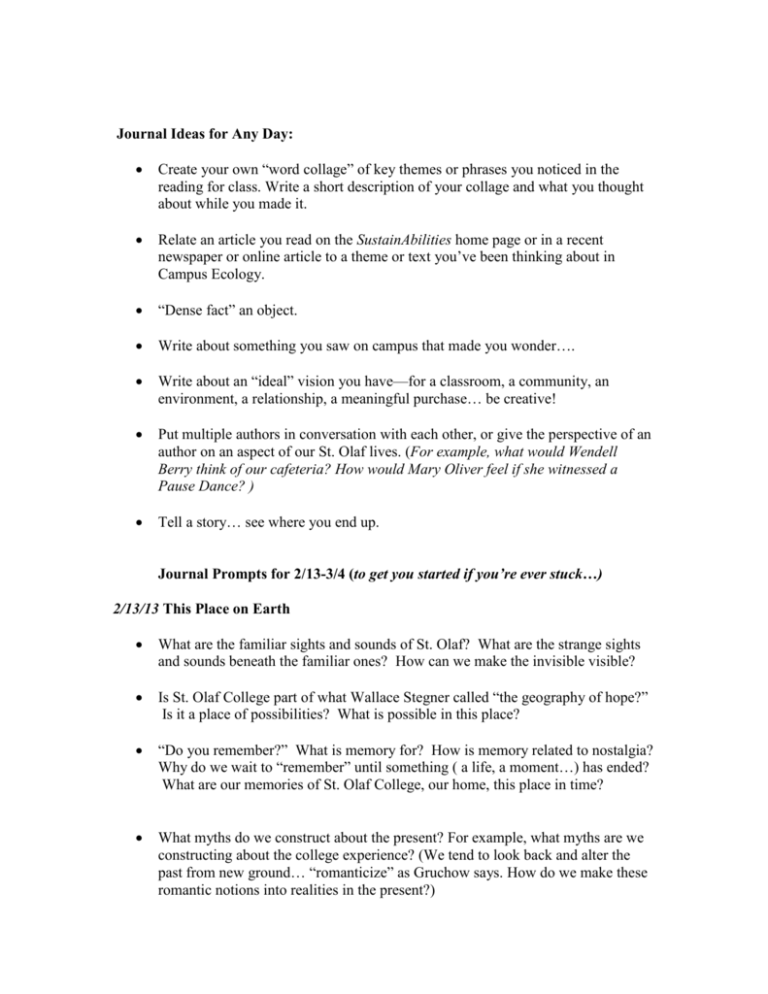
Journal Ideas for Any Day: Create your own “word collage” of key themes or phrases you noticed in the reading for class. Write a short description of your collage and what you thought about while you made it. Relate an article you read on the SustainAbilities home page or in a recent newspaper or online article to a theme or text you’ve been thinking about in Campus Ecology. “Dense fact” an object. Write about something you saw on campus that made you wonder…. Write about an “ideal” vision you have—for a classroom, a community, an environment, a relationship, a meaningful purchase… be creative! Put multiple authors in conversation with each other, or give the perspective of an author on an aspect of our St. Olaf lives. (For example, what would Wendell Berry think of our cafeteria? How would Mary Oliver feel if she witnessed a Pause Dance? ) Tell a story… see where you end up. Journal Prompts for 2/13-3/4 (to get you started if you’re ever stuck…) 2/13/13 This Place on Earth What are the familiar sights and sounds of St. Olaf? What are the strange sights and sounds beneath the familiar ones? How can we make the invisible visible? Is St. Olaf College part of what Wallace Stegner called “the geography of hope?” Is it a place of possibilities? What is possible in this place? “Do you remember?” What is memory for? How is memory related to nostalgia? Why do we wait to “remember” until something ( a life, a moment…) has ended? What are our memories of St. Olaf College, our home, this place in time? What myths do we construct about the present? For example, what myths are we constructing about the college experience? (We tend to look back and alter the past from new ground… “romanticize” as Gruchow says. How do we make these romantic notions into realities in the present?) What do you worry about? Are you depressed about the state of the world? Do you believe in progress? Do you hope? What do you hope for? What do you hope from? What are the sources of your hope? What is the “landscape of your childhood” What's the good life? 2/18/13 Rethinking Education Do you see your grades as a reflection of your intelligence? If not, when do you feel that your intellect is accurately represented? Do you have to be virtuous to be a good college student? Should colleges teach virtues? (Can they avoid it?) How does St. Olaf understand its identity and mission? How does that affect your identity and mission as a student here? What are your educational goals? Can you achieve them at this college? Write your own addition to the 2000 St. Olaf Mission Statement Fill out your own “college brain” based on the diagram in the book (page x.) Follow up: If a team of anthropologists studied everyday life at St. Olaf, looking at the actual practices of students at the college, what would they infer about our educational values? About our American values? What do we really learn here? What’s the hidden curriculum? 2/20/13 Education for a Sustainable Future How did “rankings” play into your decision to come to St. Olaf? Which rankings did you trust and why? What are the dangers of disciplines, and of professionalization? Why do we have academic departments? What is departmentalization good for? What is your major good for? What are “designing minds?” Do you have a designing mind? How many different designs are you living in? Who designed your daily life—and how? How is your coursework preparing you to design the future for yourself and your world? Have you ever felt ecologically intellectual? 2/25/13 The Environmentalist’s New Clothes What does your clothing say about you? Farrell identifies at least seven reasons that we buy clothes. Can you add to his list? What would David Orr think about LivKarin Sulerud’s St. Olaf? What advantages and disadvantages do you see in her plan? What’s the story of your jeans? See if all the steps of jean-etic planting and processing are on the manufacturer’s website. If not, write to them and tell them you want to know. Count and categorize the number of items of clothing you currently have in your dorm room. [an inventory.] List the countries spelled out on each of the tags… By doing this, you can trace the geography of your closet, the globalization of you. How do we overcome systematic ignorance? Can we start with our college campus? How? Follow up: If you were to “annotate” the campus in order to raise awareness about the environmental politics of our everyday choices, which spaces would you choose to annotate? Why? Make one annotation. 2/27 Eating as an Agricultural Act Wendell Berry cookbook entry (using guidelines from Lauren Kramer) for extra credit. The attachment can be found on our Campus Ecology Moodle page. Design an advertisement for “ethical” family dinners. Play with the ads that are in the Class Prezi, and incorporate what you’ve thought about in Kingsolver, Oliver, Orr, Neruda, and Wendell Berry’s work. Make a list of questions to ask at the Supermarket 3/4/13 Food in Thought Orr: “dense fact” a bag lunch—showing price vs. “cost” of the items in the bag. You don’t need to do too much formal research—see where your thoughts take you. Pollan (5): Write a conversation between items on a supermarket shelf. (inspiration: “Of course it’s a lot easier to slap a health claim on a box of sugary cereal than on a potato or carrot, with the perverse result that the most healthful foods in the supermarket sit there quietly in the produce section, silent as stroke victims, while a few aisles over, the Cocoa Puffs and Lucky Charms are screaming about their newfound whole-grain goodness” ) On our class online Prezi, I’ve included several images of “health claims” on recognizable food images, and I’ve also attached 2 videos about Weight Watchers and Nutrisystem. Diets, the appearance of our bodies, and the buzz about “nutrition” have become an embedded part of our American culture. Journal in response to these videos and images, or any popular culture material you find relatable. How does the constant focus on calories, measured food, and being “in shape” affect our relationships with each other and with the world around us? Steingraber: What was your favorite food growing up? Perform a Steingraber-like short analysis of its history (i.e. p. 5 “Pizza: A Natural History”) How has this article made you think about the “politics of parenting?” Will you parent your future children any differently because of it? Community Gardening: What kind of community and world do you want to live in? If a community garden isn’t an institution that will help you get there, what will? Where will you find or create “hoping mechanisms,” hopeful institutions? Gruchow’s Transfiguration of Bread: Does money make you happy? What kind of life do you want? (108) Why does Gruchow give us a title with religious connotations? Gruchow’s Guerrilla Warfare: (104) Explain your reaction to the image painted of artificial and sterile agriculture. If eating is a political act, how do you plan to change your agriculture?
